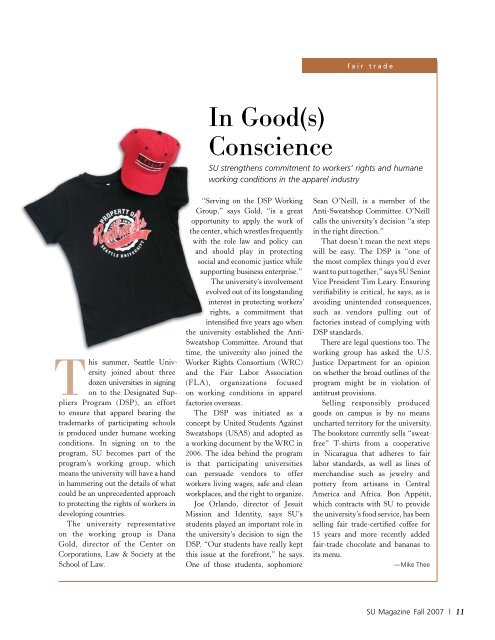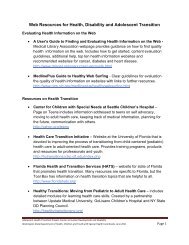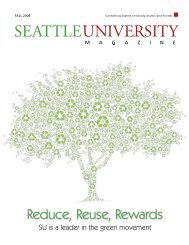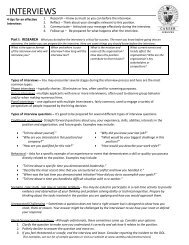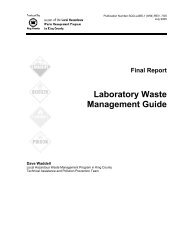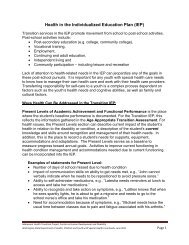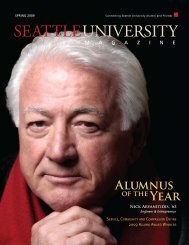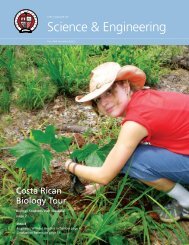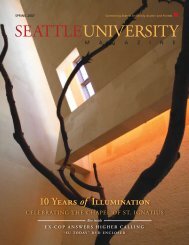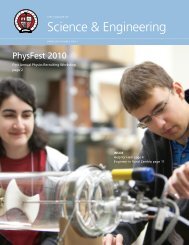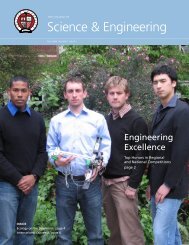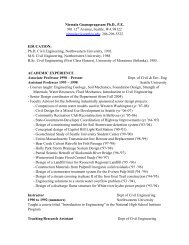Assessing How We Define Diversity - Seattle University
Assessing How We Define Diversity - Seattle University
Assessing How We Define Diversity - Seattle University
You also want an ePaper? Increase the reach of your titles
YUMPU automatically turns print PDFs into web optimized ePapers that Google loves.
fair trade<br />
In Good(s)<br />
Conscience<br />
SU strengthens commitment to workers’ rights and humane<br />
working conditions in the apparel industry<br />
This summer, <strong>Seattle</strong> <strong>University</strong><br />
joined about three<br />
dozen universities in signing<br />
on to the Designated Suppliers<br />
Program (DSP), an effort<br />
to ensure that apparel bearing the<br />
trademarks of participating schools<br />
is produced under humane working<br />
conditions. In signing on to the<br />
program, SU becomes part of the<br />
program’s working group, which<br />
means the university will have a hand<br />
in hammering out the details of what<br />
could be an unprecedented approach<br />
to protecting the rights of workers in<br />
developing countries.<br />
The university representative<br />
on the working group is Dana<br />
Gold, director of the Center on<br />
Corporations, Law & Society at the<br />
School of Law.<br />
“Serving on the DSP Working<br />
Group,” says Gold, “is a great<br />
opportunity to apply the work of<br />
the center, which wrestles frequently<br />
with the role law and policy can<br />
and should play in protecting<br />
social and economic justice while<br />
supporting business enterprise.”<br />
The university’s involvement<br />
evolved out of its longstanding<br />
interest in protecting workers’<br />
rights, a commitment that<br />
intensified five years ago when<br />
the university established the Anti-<br />
Sweatshop Committee. Around that<br />
time, the university also joined the<br />
Worker Rights Consortium (WRC)<br />
and the Fair Labor Association<br />
(FLA), organizations focused<br />
on working conditions in apparel<br />
factories overseas.<br />
The DSP was initiated as a<br />
concept by United Students Against<br />
Sweatshops (USAS) and adopted as<br />
a working document by the WRC in<br />
2006. The idea behind the program<br />
is that participating universities<br />
can persuade vendors to offer<br />
workers living wages, safe and clean<br />
workplaces, and the right to organize.<br />
Joe Orlando, director of Jesuit<br />
Mission and Identity, says SU’s<br />
students played an important role in<br />
the university’s decision to sign the<br />
DSP. “Our students have really kept<br />
this issue at the forefront,” he says.<br />
One of those students, sophomore<br />
Sean O’Neill, is a member of the<br />
Anti-Sweatshop Committee. O’Neill<br />
calls the university’s decision “a step<br />
in the right direction.”<br />
That doesn’t mean the next steps<br />
will be easy. The DSP is “one of<br />
the most complex things you’d ever<br />
want to put together,” says SU Senior<br />
Vice President Tim Leary. Ensuring<br />
verifiability is critical, he says, as is<br />
avoiding unintended consequences,<br />
such as vendors pulling out of<br />
factories instead of complying with<br />
DSP standards.<br />
There are legal questions too. The<br />
working group has asked the U.S.<br />
Justice Department for an opinion<br />
on whether the broad outlines of the<br />
program might be in violation of<br />
antitrust provisions.<br />
Selling responsibly produced<br />
goods on campus is by no means<br />
uncharted territory for the university.<br />
The bookstore currently sells “sweatfree”<br />
T-shirts from a cooperative<br />
in Nicaragua that adheres to fair<br />
labor standards, as well as lines of<br />
merchandise such as jewelry and<br />
pottery from artisans in Central<br />
America and Africa. Bon Appétit,<br />
which contracts with SU to provide<br />
the university’s food service, has been<br />
selling fair trade-certified coffee for<br />
15 years and more recently added<br />
fair-trade chocolate and bananas to<br />
its menu.<br />
—Mike Thee<br />
SU Magazine Fall 2007 | 11


